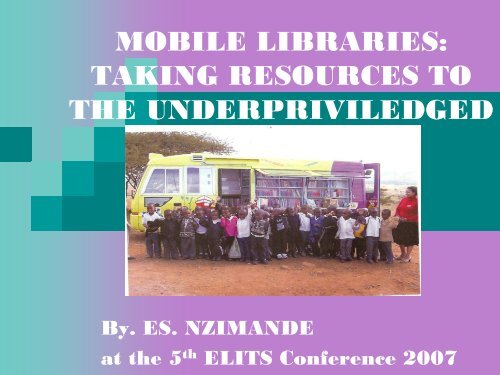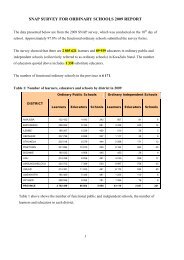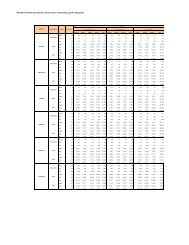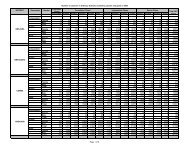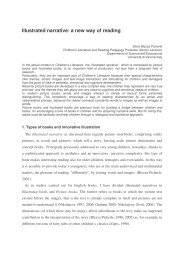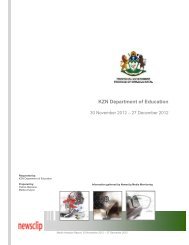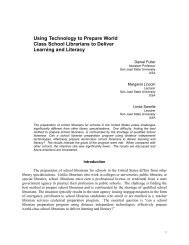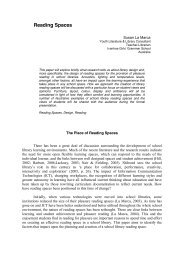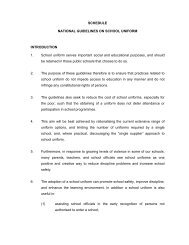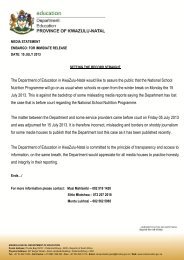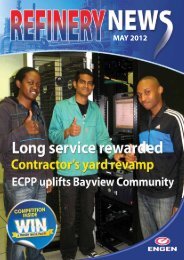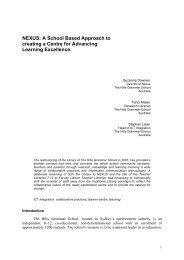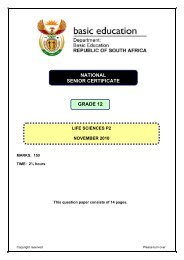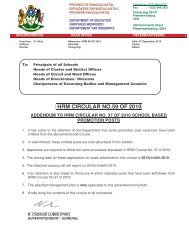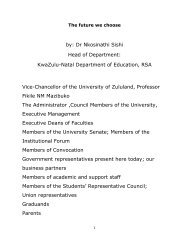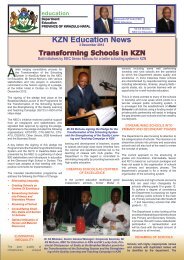mobile libraries - KwaZulu-Natal Department of Education
mobile libraries - KwaZulu-Natal Department of Education
mobile libraries - KwaZulu-Natal Department of Education
You also want an ePaper? Increase the reach of your titles
YUMPU automatically turns print PDFs into web optimized ePapers that Google loves.
MOBILE LIBRARIES:<br />
TAKING RESOURCES TO<br />
THE UNDERPRIVILEDGED<br />
By. ES. NZIMANDE<br />
at the 5 th ELITS Conference 2007
1. Introduction<br />
Mobile <strong>libraries</strong> were introduced in <strong>KwaZulu</strong>-<strong>Natal</strong> (KZN)<br />
five years ago. This project emanated from a long-standing<br />
partnership between Together with Africa and Asia<br />
Association (TAAA), a Japanese-based NGO, and the KZN<br />
<strong>Department</strong> <strong>of</strong> <strong>Education</strong>.<br />
Since 2002 <strong>mobile</strong> <strong>libraries</strong> have been donated to serve the<br />
areas <strong>of</strong>:<br />
• Indwedwe (outside Durban) and<br />
• Mahlabathini (in Zululand)<br />
• Later a third <strong>mobile</strong> library was donated for Mbazwana in<br />
Northern Zululand.<br />
At almost the same time, another significant development<br />
unfolded, and that was the establishment <strong>of</strong> <strong>Education</strong><br />
Centres in several areas <strong>of</strong> the province. This project<br />
anticipated a roll-out <strong>of</strong> <strong>mobile</strong> <strong>libraries</strong> from these <strong>Education</strong><br />
Centres, 12 District <strong>Education</strong> Centres were established to<br />
accommodate <strong>mobile</strong> library services as well.
The District <strong>Education</strong> Centres serve as nodes or hubs<br />
for school clusters that will be serviced by the <strong>mobile</strong><br />
<strong>libraries</strong>. TAAA understood this state <strong>of</strong> readiness and<br />
pledged to donate <strong>mobile</strong> <strong>libraries</strong> for all the 12<br />
District <strong>Education</strong> Centres, thus ensuring that each<br />
education district owns a <strong>mobile</strong> library. Nine<br />
additional <strong>mobile</strong> <strong>libraries</strong> have been received by<br />
ELITS.<br />
An extra Mobile library affectionately named by Mr.<br />
Hasinuma as ‘Lobola’ will also be received late in<br />
2007 as a standby incase one <strong>of</strong> the operational <strong>mobile</strong><br />
<strong>libraries</strong> is in for service;<br />
At provincial ‘Imbizo’s the MEC for <strong>Education</strong><br />
requires that a <strong>mobile</strong> library be exhibited as an<br />
exposé <strong>of</strong> some <strong>of</strong> the departmental projects. Lobola<br />
will be used for this.
2. Goal<br />
• To support curriculum delivery and promote the<br />
philosophy <strong>of</strong> reading for knowledge and pleasure.<br />
3. Objectives<br />
• To improve provincial literacy levels in response to<br />
the Systemic Evaluation Reports <strong>of</strong> 2001 and 2004<br />
• To promote the use <strong>of</strong> <strong>libraries</strong> as important<br />
sources <strong>of</strong> information particularly in rural schools<br />
and in those schools that have not yet benefited form<br />
the School Library Development Project (SLDP)
• To provide relevant information resources that<br />
support curriculum delivery – ECD, GET, FET, ABET<br />
• To <strong>of</strong>fer resources which support the relevant priority<br />
subjects such as HIV/AIDS, ICT, Career Guidance,<br />
Nutrition, etc and promoting the Whole School<br />
Information Literacy philosophy<br />
• To orientate teachers and learners in the use <strong>of</strong><br />
<strong>libraries</strong>, particularly those that do not have central<br />
<strong>libraries</strong> yet.<br />
• To promote, through the attainment <strong>of</strong> Information<br />
literacy skills, the ability to collect, analyse, organise<br />
and critically evaluate information from a variety <strong>of</strong><br />
multi-media resources, such as print, non-print and<br />
electronic sources<br />
• To reach learners through their well-resourced<br />
teachers by <strong>of</strong>fering a regular, timetabled <strong>mobile</strong> library<br />
service.
CONNECTIONS<br />
EDUCATION CENTRES<br />
LIBRARY<br />
Supports functions:<br />
Policy implementation (School Library, Reading, Inclusive <strong>Education</strong>, ICT,<br />
Workshops<br />
Block loans<br />
<strong>Education</strong>al research<br />
Displays<br />
ACE support<br />
Reading & other educational activities<br />
MOBILE LIBRARY<br />
MOBILE<br />
Books, videos, CDs, CD-Roms, Posters & charts, computer s<strong>of</strong>tware,etc.<br />
Transparencies, Audio cassettes, Journals, periodicals…… on wheels<br />
SCHOOLS<br />
* Teachers integrate resource use in curriculum delivery<br />
* Learners are informed and enthusiastic readers
Mobile library Collection<br />
LINE FUNCTION CONNECTIONS<br />
EDUCATION CENTRES<br />
<strong>Education</strong> Centre Library<br />
MOBILE LIBRARIES<br />
School Principal<br />
(as Responsibility manager)<br />
Support programmes<br />
(Implementation <strong>of</strong><br />
relevant policies<br />
school library;<br />
Reading policy<br />
guidelines ICT).<br />
• Block loans<br />
• Research<br />
• Displays<br />
• ACE<br />
•Teachers integrate resources into teaching and learning for<br />
effective curriculum delivery (Information Skills)<br />
•Learners become informed enthusiastic readers (literate learners).<br />
OUTCOMES<br />
• Good governance<br />
•Improved literacy levels<br />
•Information literate teachers and learners.<br />
•Improved grade 12 results<br />
RESOURCES IN THE MOBILE LIBRARY<br />
Books, videos, CD’s, CD-Roms, posters, charts, globes, maps, journals etc.
4. RATIONALE FOR THE FORMATION OF<br />
CLUSTERS<br />
It is a well-known fact that developing countries, with a few<br />
exceptions are poor, and that the most chronic problem faced<br />
by <strong>libraries</strong> in developing countries is a constant shortage <strong>of</strong><br />
funds (Bonazza 1986). South Africa is a young democracy<br />
that has put in place a constitution that propagates numerous<br />
rights. The most significant one’s are those that support the<br />
right to basic education, and access to information.<br />
Information is however not readily available in most schools,<br />
this is because school <strong>libraries</strong> are at different stages <strong>of</strong><br />
development due to lack <strong>of</strong> funding. School <strong>libraries</strong> in<br />
<strong>KwaZulu</strong>-<strong>Natal</strong> are suffering a similar fate, thus in order to<br />
<strong>of</strong>fer schools continued support a strategy that was to focus<br />
on education delivery at the level <strong>of</strong> school clusters was<br />
conceived. Schools were grouped together for mutual benefit,<br />
and this strategy would build on, and consolidate a number <strong>of</strong><br />
existing synergistic initiatives.
1.1. Background<br />
1.2. The clustering concept.<br />
This strategy was aimed at supporting schools in rural<br />
areas in order to develop capacity, and <strong>of</strong>fer access to<br />
services and resources made available through the<br />
Provincial <strong>Department</strong> <strong>of</strong> <strong>Education</strong>, other service<br />
providers, and non-government organizations<br />
(NGO’s). The schools in rural areas would be<br />
transformed into self reliant, and effective learning<br />
institutions, and this support was in the context <strong>of</strong> the<br />
<strong>KwaZulu</strong>-<strong>Natal</strong> <strong>Department</strong> <strong>of</strong> <strong>Education</strong> and<br />
Culture’s (KZNDEC) policies and strategies<br />
(<strong>KwaZulu</strong>-<strong>Natal</strong> 2000 and 2003a)
The reasons for clustering were:<br />
• To develop the capacity <strong>of</strong> school cluster<br />
communities to effectively manage and support<br />
education delivery in member schools. <strong>Department</strong>al<br />
structures lack capacity to provide effective and<br />
continuous support to the Provinces far-flung and in<br />
accessible rural schools.<br />
• Some rural schools lack organizational capacity, thus<br />
making it difficult to access resources.
• The lack <strong>of</strong> resources makes it necessary to share a<br />
range <strong>of</strong> educational materials.<br />
• The isolated and <strong>of</strong>ten inaccessible position <strong>of</strong> rural<br />
schools make it necessary to maximize resources by<br />
clustering schools.<br />
• To set up support networks in clusters <strong>of</strong> schools to<br />
enable educators to cope with the great pressure <strong>of</strong><br />
the demands <strong>of</strong> curriculum 2005.<br />
• More community involvement in schools could<br />
alleviate the security risks in schools, in terms <strong>of</strong><br />
vandalism and lack <strong>of</strong> safety for educators and<br />
learners. (<strong>KwaZulu</strong>-<strong>Natal</strong>…1999)<br />
• The rationale for clustering is in line with the<br />
KZNDEC’s strategic goals which are:<br />
• Providing learners with quality education
• Transforming the department into a high<br />
performance organization that focuses on results and<br />
quality<br />
• Promoting opportunities for effective leadership and<br />
management development at district level<br />
• Providing and utilizing resources to achieve redress<br />
and equity<br />
• Promoting the advancement <strong>of</strong> women<br />
• Developing school governing bodies into effective<br />
support structures<br />
• Addressing and counteracting HIV/AIDS threats<br />
• Promoting further education and training<br />
• Promoting adult basic education and training<br />
(<strong>KwaZulu</strong>-<strong>Natal</strong> 2003a)
The cluster concept is also in line with the Government’s<br />
Integrated Sustainable Rural Development Strategy<br />
(ISRDS) the vision <strong>of</strong> which is to:<br />
Attain socially cohesive and stable rural communities<br />
with viable institutions, sustainable economies and<br />
universal access to social amenities able to attract and<br />
retain skilled and knowledgeable people, who are<br />
equipped to contribute to growth and development<br />
(ISRDS. 2000:3)<br />
Another project that gave rise to the cluster concept was<br />
the grouping <strong>of</strong> schools in order to distribute to a<br />
network <strong>of</strong> cluster schools in different areas <strong>of</strong> <strong>KwaZulu</strong>-<br />
<strong>Natal</strong> and this was initiated through the ‘Resources and<br />
Information Network’ (RAIN), a project conceived as a<br />
distribution network to reach all schools in <strong>KwaZulu</strong>-<br />
<strong>Natal</strong>. (RAIN 2004 p11)
Other cluster initiatives were developed by the<br />
District Development Support Project (DDSP)<br />
later known as the Mthonjeni Project, and the<br />
<strong>Education</strong> Library Information and Technology<br />
Services Directorate (ELITS) around resource<br />
centres involving <strong>mobile</strong> <strong>libraries</strong>.<br />
This means that the school cluster communities<br />
evolved through different interventions, assuming<br />
different paces <strong>of</strong> development, with different levels<br />
<strong>of</strong> needs, and differing guiding principles. In essence<br />
all cluster communities will not be the same.<br />
Awareness <strong>of</strong> school clustering as a concept and<br />
practice and their preparedness to embark on<br />
clustering is likely to differ from one area to the<br />
next, and thus the dissimilarities in the formation<br />
and evolution <strong>of</strong> clusters can be expected.
The most recent cluster are the MIET clusters<br />
around <strong>Education</strong> centres.<br />
For the Mobile library project it is not necessary<br />
to establish the clusters. The project will thus<br />
inherit the clusters around <strong>Education</strong> centres.<br />
The cluster may however be changed slightly for<br />
the <strong>mobile</strong> library because factors like terrain;<br />
distances, road conditions; may require that the<br />
route be determined to factor in the above<br />
mentioned issues.
If in the process <strong>of</strong> affirming the <strong>mobile</strong> library cluster<br />
it happens that some cluster schools due to terrain,<br />
distances or road conditions may not be reached they<br />
will automatically be resourced through the SLD<br />
project (school library development).<br />
Each <strong>mobile</strong> library cluster therefore will be<br />
determined by the district, subject to confirmation by<br />
the service provider who will generate a map for the<br />
route (that is in the pipeline).<br />
• Information on existing cluster<br />
See MIET List<br />
• Mobile library cluster committees (must be formed by<br />
each district).
5. What will cluster schools benefit from a Mobile Library<br />
service<br />
Once the clusters are formed or their existence confirmed<br />
then the following should happen.<br />
• Orientate schools to the service <strong>of</strong> the <strong>mobile</strong> <strong>libraries</strong>.<br />
• Resource selection. (The cluster schools need to participate in<br />
this exercise).<br />
• Use <strong>of</strong> resources to support the curriculum.<br />
• Reading programmes.<br />
• Time tabled visits to schools.<br />
• Block loans to cluster schools.<br />
• Teacher support material.<br />
• ICT support
6. Lending procedures<br />
The circulation <strong>of</strong> <strong>mobile</strong> resources should be inline with<br />
standard library lending procedures. Depending on the<br />
individual needs <strong>of</strong> the school<br />
Two types <strong>of</strong> lending procedures could be followed viz:<br />
• Loan to individual users<br />
• Or block loans to a school<br />
• Responsibilities (These could be determined at District<br />
level – However there should be guiding principles<br />
layed down by Head Office)<br />
• Principal<br />
• Teacher-Librarian<br />
• Educator(s)<br />
• Learner(s)<br />
• Parent(s)
If a new cluster is to be formed; consider the following:<br />
• Baseline Study<br />
• The formation <strong>of</strong> clusters must be in line with existing<br />
clusters, however other factors could be used to<br />
determine the <strong>mobile</strong> library route, for example:<br />
• Access (no school or public library)<br />
• Redress<br />
• Isolation<br />
• Matric intervention<br />
• Special projects<br />
• Amajuba Cluster<br />
• Map<br />
• Empangeni Cluster<br />
• Map<br />
• Ilembe Cluster<br />
• Map
• Kokstad Cluster<br />
• Map<br />
• Mzinyathi Cluster<br />
• Map<br />
• Obonjeni Cluster<br />
• Map<br />
• Pinetown Cluster<br />
• Map<br />
• Portshepstone Cluster<br />
• Map<br />
• Umgungundlovu Cluster<br />
• Map<br />
• Umlazi Cluster<br />
• Map<br />
• Uthukela Cluster<br />
• Map<br />
• Vryheid Cluster<br />
• Map
7. Post Establishment<br />
7.1. The staff required are:<br />
• Teacher Librarian<br />
• 1 x Library Assistant<br />
• 1 x Driver (Title : Mobile library operator: or<br />
<strong>mobile</strong> library support).<br />
7.2. Job descriptions
8. Management <strong>of</strong> the Mobile Library<br />
8.1. Introduction<br />
Mobile <strong>libraries</strong> will be managed from the <strong>Education</strong><br />
Centres. The Centre manager will oversee the entire<br />
project, but it is the Teacher-librarian, working closely<br />
with the Library Assistant who will be responsible for<br />
the day-to-day operation <strong>of</strong> the <strong>mobile</strong> unit and will<br />
• receive and execute requests for resources and services<br />
• identify resources on request and package resources<br />
according to schools<br />
• maintain a circulation register.
8.2. Outreach to the clusters<br />
The Library Assistant / or Teacher Librarian<br />
will go out with the <strong>mobile</strong> library to render<br />
relevant administrative work and advise teachers on<br />
the services <strong>of</strong>fered.<br />
The driver will assist with packaging, loading and<br />
<strong>of</strong>f-loading <strong>of</strong> loan materials, and will be<br />
responsible for the general maintenance <strong>of</strong> the<br />
<strong>mobile</strong> library vehicle.<br />
It is important that ideally one day be set aside for<br />
stock control and general maintenance <strong>of</strong> the vehicle.
8.3 Time Table<br />
• Receive requests<br />
• Plan<br />
• Package<br />
• Dispatch<br />
8.4. School based activities<br />
• Preliminary meeting(s)<br />
• Planned activities (Reading, Readathon etc).<br />
• Block loans<br />
• Book/resource selection<br />
• Reading activities
9. Monitoring and evaluation<br />
• All subject advisors (not only ELITS Advisors)<br />
must support the project closely. They must<br />
participate in the selection <strong>of</strong> resources and<br />
integrated use <strong>of</strong> those resources in teaching and<br />
learning, and as such, must regularly monitor and<br />
evaluate the project.<br />
• ELITS advisors must ensure the relevance <strong>of</strong> stock,<br />
that reading programmes are in place and that there is<br />
sustained collaboration with relevant Languages<br />
Learning Area coordinators.<br />
• ELITS advisors, working with the Centre Teacherlibrarian,<br />
must supply the District Manager and<br />
ELITS Head Office with all the relevant statistical<br />
data on a monthly basis, i.e.
• Number <strong>of</strong> cluster schools<br />
• Accurate school information<br />
• Number and data <strong>of</strong> resources borrowed and<br />
returned<br />
• Losses and damages incurred<br />
• Subject or learning areas requiring more<br />
stock.<br />
This information is to be accompanied by a<br />
summative report, using a recommended<br />
template. (This must form part <strong>of</strong> the “Mobile<br />
Library Guidelines”).
Advocacy<br />
• Target group (Who)<br />
• How (Strategies)<br />
• Sustenance (How)
Training<br />
• Core programme(s) (There should be<br />
standard training programmes).<br />
NB Mobile <strong>libraries</strong> could be<br />
factored into one ACE Module.<br />
• Onsite training<br />
• Principals (involvement)
Management <strong>of</strong> Operations<br />
• School based resources (Who?)<br />
• Resourcing<br />
- Idea <strong>of</strong> ELITS depots to be<br />
explored).
Trouble shooting manual<br />
(This needs to be developed,<br />
and form part <strong>of</strong> the ‘Mobile<br />
Library Guidelines’).
ICT (PALS)<br />
(To be or not to be??).
HANDOVER FUNCTION<br />
(Please invite me☻)
Bus Received Allocated To Bus Info Reg. No. Make/Engine No. Size Comments<br />
Three buses (existing service)<br />
Mbazwana bus Mbazwana No p/card<br />
liaise transport<br />
KZN 65903<br />
Mitsubishi<br />
4D33D47755<br />
Inanda Inanda Operational KZN 65812 Mitsubishi<br />
4D32685522<br />
Ex-Ulundi Abaqulusi No p/card,<br />
liaise transport<br />
Four buses – June 2006<br />
2006(1) Ukhahlamba Not starting<br />
has battery<br />
KZN 65904<br />
KZN 66356<br />
2006 (2) Umlazi KZN 66353<br />
(STOLEN)<br />
2006 (3) Pungashe Battery + starts.<br />
Cannot lock driver<br />
door<br />
KZN 66355<br />
Isuzu<br />
WHR55E7600960<br />
Isuzu<br />
NPR66L-7106495<br />
Isuzu<br />
NKR66E-7123159<br />
Mitsubishi<br />
FE305B480971<br />
2006 (4) Tugela Ferry All OK KZN 66354 Isuzu<br />
BL38-710047<br />
Three buses – August 2006<br />
MOBILE LIBRARIES IN KZNDoE: ALLOCATION LIST<br />
2006 (5) Umgungundlovu STOLEN Mitsubishi (1993)<br />
FE317BN-490419<br />
2006 (6) Majuba Has battery,<br />
not starting<br />
2006 (7) Maphumulo Has battery,<br />
not starting<br />
No KZN<br />
No KZN<br />
Toyota<br />
BU1020104598<br />
HINO<br />
FD3WHA-10032<br />
L 637cm<br />
W 205cm<br />
H 272cm<br />
L 500cm<br />
W 176cm<br />
H 250cm<br />
L 617cm<br />
W 195cm<br />
H 269 cm<br />
L 660 cm<br />
W 220cm<br />
H 275cm<br />
L 620cm<br />
W 199cm<br />
H 288cm<br />
L 498cm<br />
W 173cm<br />
H 249cm<br />
L 750cm<br />
W 230cm<br />
H 324cm<br />
NB: FIGHT WITH KHANYI AND MARIANA<br />
Bus needs p/card etc.<br />
Parked Ulundi Transport<br />
Inanda bus – stationed Dokkies)<br />
Ex Mahlabathini bus<br />
Bus needs p/card etc.<br />
Parked Ulundi Transport<br />
Parked Dokkies<br />
Branded and ready<br />
Bus was stolen. New one to be<br />
ordered 2008/9<br />
Parked Dokkies<br />
Branded and ready<br />
Parked Dokkies<br />
Branded and ready<br />
Bus was stolen<br />
New bus ordered<br />
Parked Dokkies, Need branding,<br />
KZN nr. plates.<br />
Parked Dokkies, need branding,<br />
KZN nr. Plates.


